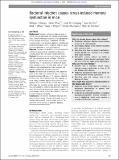| dc.contributor.author | Gareau, Melanie G. | |
| dc.contributor.author | Wine, Eytan | |
| dc.contributor.author | Rodrigues, David M. | |
| dc.contributor.author | Cho, Joon Ho | |
| dc.contributor.author | Whary, Mark T. | |
| dc.contributor.author | Philpott, Dana J. | |
| dc.contributor.author | MacQueen, Glenda | |
| dc.contributor.author | Sherman, Philip M. | |
| dc.date.accessioned | 2011-06-14T15:12:48Z | |
| dc.date.available | 2011-06-14T15:12:48Z | |
| dc.date.issued | 2010-10 | |
| dc.date.submitted | 2010-09 | |
| dc.identifier.issn | 0017-5749 | |
| dc.identifier.uri | http://hdl.handle.net/1721.1/64426 | |
| dc.description.abstract | Background: The brain–gut axis is a key regulator of normal intestinal physiology; for example, psychological stress is linked to altered gut barrier function, development of food allergies and changes in behaviour. Whether intestinal events, such as enteric bacterial infections and bacterial colonisation, exert a reciprocal effect on stress-associated behaviour is not well established.
Objective: To determine the effects of either acute enteric infection or absence of gut microbiota on behaviour, including anxiety and non-spatial memory formation.
Methods: Behaviour was assessed following infection with the non-invasive enteric pathogen, Citrobacter rodentium in both C57BL/6 mice and germ-free Swiss-Webster mice, in the presence or absence of acute water avoidance stress. Whether daily treatment with probiotics normalised behaviour was assessed, and potential mechanisms of action evaluated.
Results: No behavioural abnormalities were observed, either at the height of infection (10 days) or following bacterial clearance (30 days), in C rodentium-infected C57BL/6 mice. When infected mice were exposed to acute stress, however, memory dysfunction was apparent after infection (10 days and 30 days). Memory dysfunction was prevented by daily treatment of infected mice with probiotics. Memory was impaired in germ-free mice, with or without exposure to stress, in contrast to conventionally reared, control Swiss-Webster mice with an intact intestinal microbiota.
Conclusions: The intestinal microbiota influences the ability to form memory. Memory dysfunction occurs in infected mice exposed to acute stress, while in the germ-free setting memory is altered at baseline. | en_US |
| dc.language.iso | en_US | |
| dc.publisher | BMJ Publishing | en_US |
| dc.relation.isversionof | http://dx.doi.org/10.1136/gut.2009.202515 | en_US |
| dc.rights | Article is made available in accordance with the publisher's policy and may be subject to US copyright law. Please refer to the publisher's site for terms of use. | en_US |
| dc.source | BMJ | en_US |
| dc.title | Bacterial infection causes stress-induced memory dysfunction in mice | en_US |
| dc.type | Article | en_US |
| dc.identifier.citation | Gareau, Mélanie G et al. “Bacterial Infection Causes Stress-induced Memory Dysfunction in Mice.” Gut 60.3 (2011) : 307 -317. © 2011 BMJ Publishing Group Ltd & British Society of Gastroenterology | en_US |
| dc.contributor.department | Massachusetts Institute of Technology. Division of Comparative Medicine | en_US |
| dc.contributor.approver | Whary, Mark T. | |
| dc.contributor.mitauthor | Whary, Mark T. | |
| dc.relation.journal | Gut | en_US |
| dc.eprint.version | Final published version | en_US |
| dc.type.uri | http://purl.org/eprint/type/JournalArticle | en_US |
| eprint.status | http://purl.org/eprint/status/PeerReviewed | en_US |
| dspace.orderedauthors | Gareau, M. G.; Wine, E.; Rodrigues, D. M.; Cho, J. H.; Whary, M. T.; Philpott, D. J.; MacQueen, G.; Sherman, P. M. | en |
| mit.license | PUBLISHER_POLICY | en_US |
| mit.metadata.status | Complete | |

